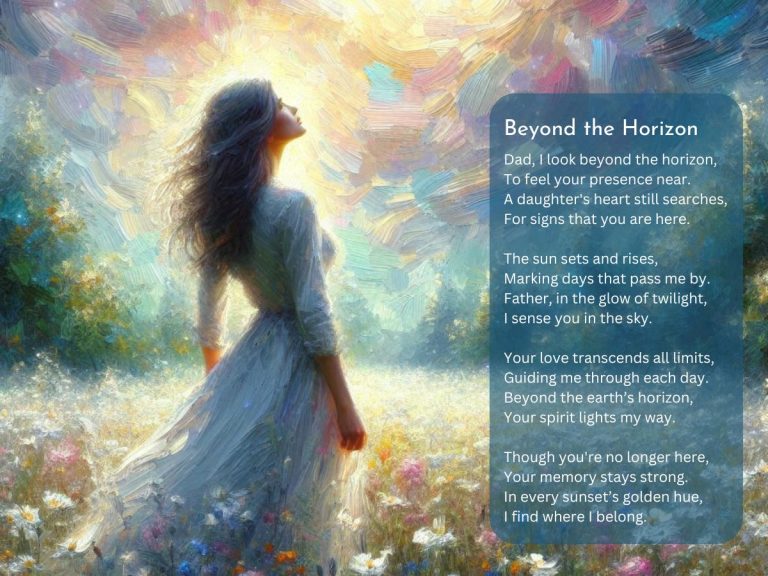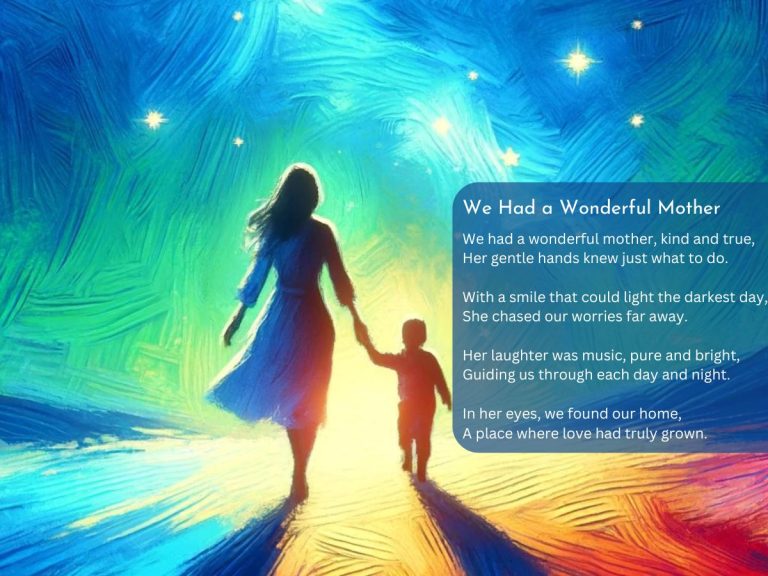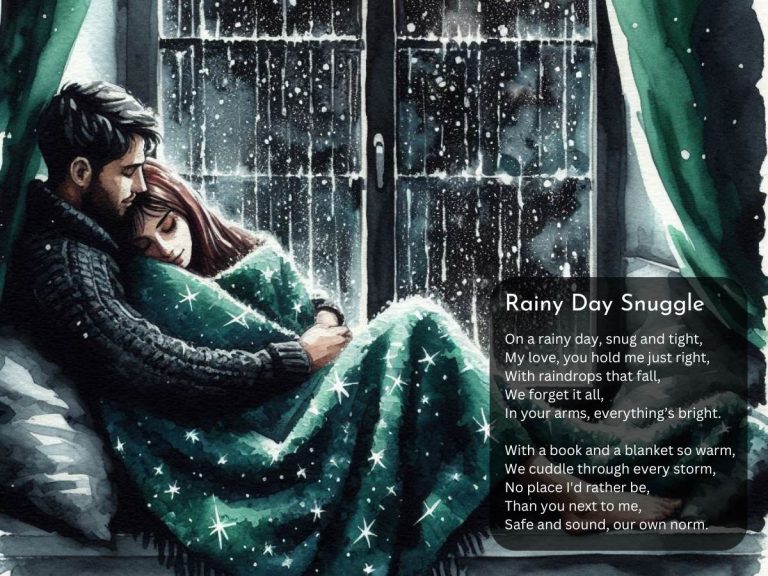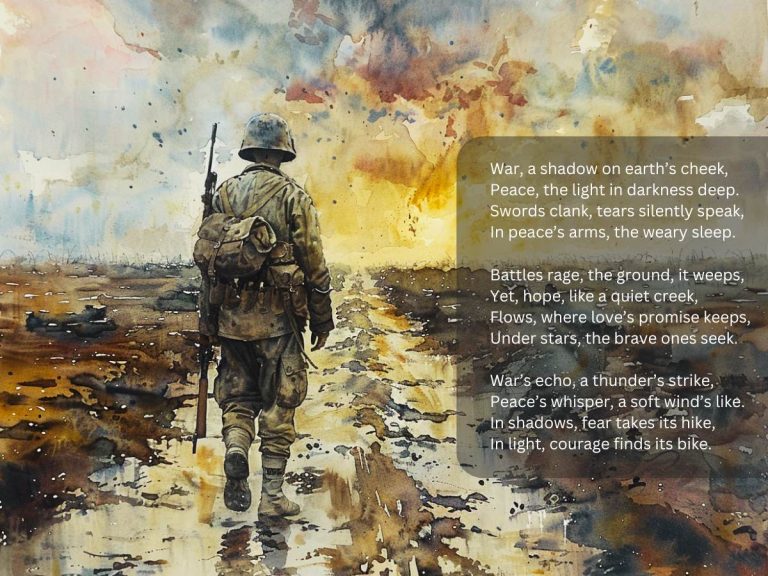Bereaved Mother’s Day Poems
Table of Contents
Quiet Rooms
In rooms where laughter once did play,
A silence settles, dense and deep.
Light footprints fade in dusk’s gray sweep,
Where joy once bloomed, shadows now stay.
Each corner holds a whispered loss,
Gentle echoes of a name.
Tears blend seamless with the rain,
A mother's love bears untold cost.
Time ticks on, relentless, slow,
Memories like soft candle glow,
Flickering in the quiet night,
Holding on to love, to light.
Yet through the pain, this love remains,
Strong as stone, 'midst silent strains,
In every beat, her heart refrains—
A bond that loss can never claim.
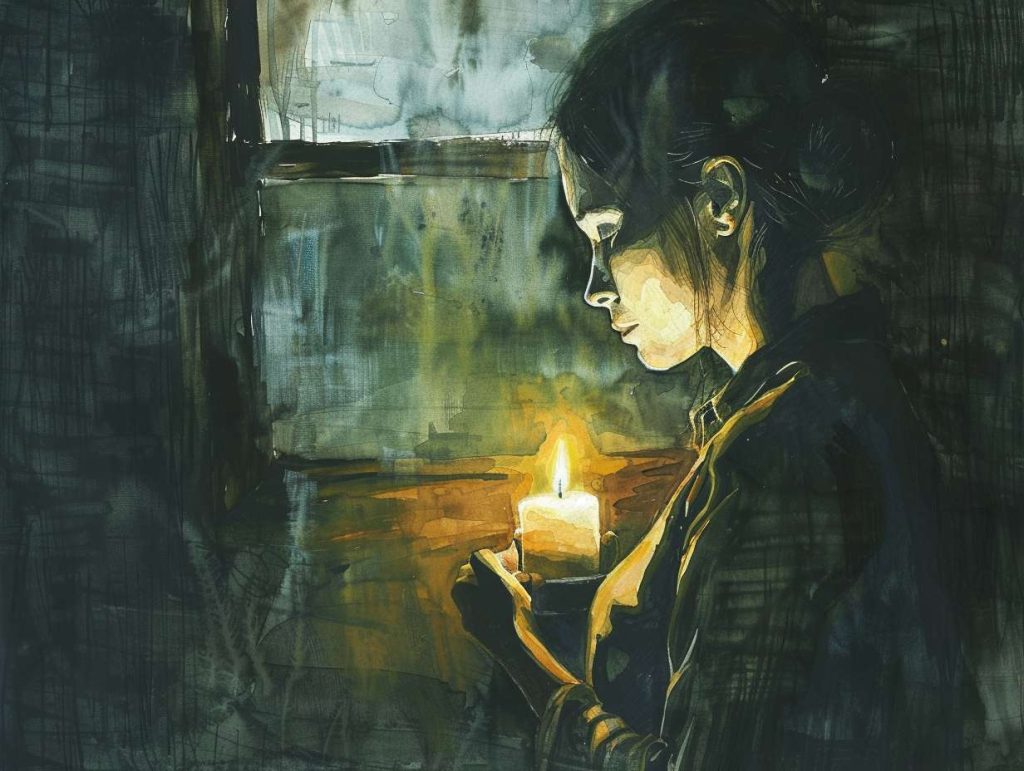
Meaning
This poem speaks to the enduring ache and beauty of a mother’s love after the loss of a child. The imagery of fading footprints and soft candlelight portrays the delicate balance between remembering and mourning. Each line attempts to capture the profound stillness and the silent strength found in the quietude of loss, emphasizing that the bond between a mother and her child is immutable, unaffected by even the most profound grief.
Inspiration Behind
I envisioned the rooms filled not with presence but with memories, like photographs fading at the edges but still vibrant in the center. I thought of the tears that blend with rain, nature’s own way of mourning, and how a mother’s heart keeps a relentless beat of remembrance. This poem is for every mother who carries love and loss in silent harmony, a testament to the quiet strength that endures.
Silent Cradle Songs
In the stillness of her room,
Soft shadows dance on empty walls.
Her hands, once warm with life, recall
The silent songs of loom and loom.
Each nightfall brings the moon's soft gleam,
Its light a touch upon her cheek.
In solitude, she does not speak,
Yet sings where only stars can beam.
Her grief—a quiet, steady flame,
That burns not out, but deeper in.
Through tears that flow, and pain that spins,
Her strength, a silent, sacred claim.
For every mother's silent prayer,
A cradle song, the night air fills.
In whispers not, but silence thrills,
Her heart holds on, tender and bare.
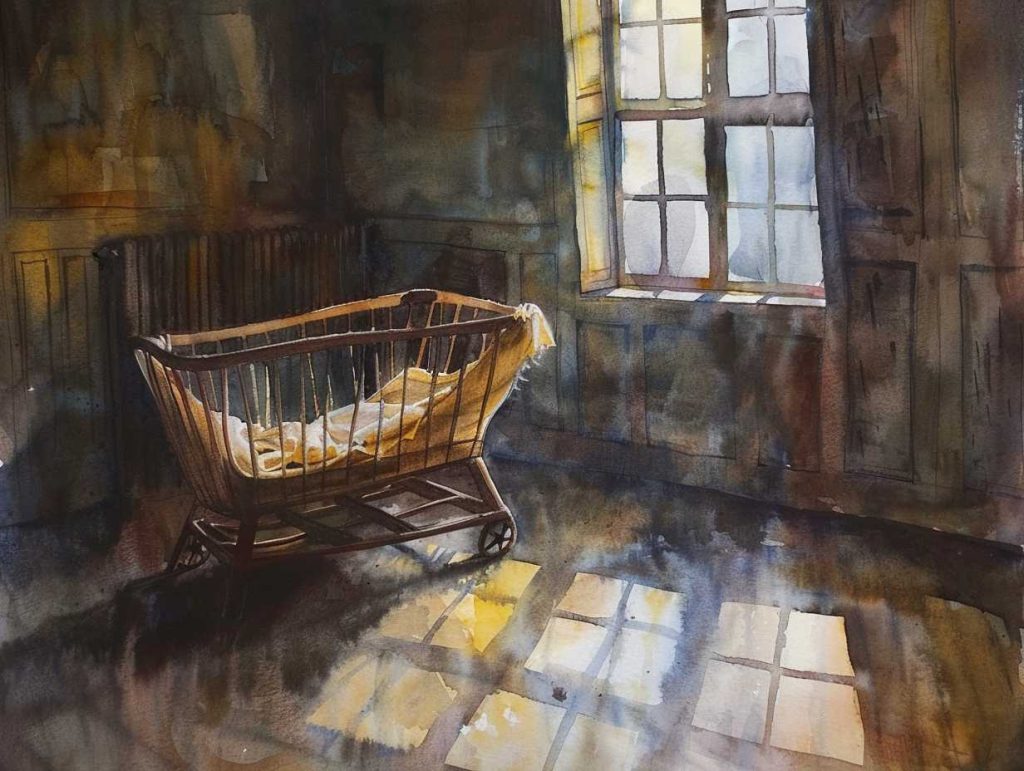
Meaning
“Silent Cradle Songs” delves into the profound internal resilience of a mother enduring the grief of losing a child. The imagery of soft shadows and moonlight reflects the gentle but powerful nature of her mourning. The poem emphasizes that her strength is not overt or loud but is an inward, burning flame fueled by love and loss. It suggests a deep connection to her child that transcends spoken words, manifesting instead in the quiet dignity of her sorrow.
Inspiration Behind
I imagined a mother surrounded by the quiet of the night, her grief as present as the moonlight touching her face. There is beauty in her resilience, found not in loud declarations but in the way she carries her love and loss with quiet dignity. This poem is a tribute to all mothers who find strength in their solitude, their silent songs a poignant lullaby of enduring love and memory.
Echoes of Joy, Shadows of Pain
Joy once danced in these quiet halls,
Echoes soft of tiny feet.
Now shadows stretch where laughter met,
Grief the echo that enthralls.
Her arms, once full, now ache with void,
Each daybreak brings both sun and storm.
Memories sweet, with sorrow torn,
In silent rooms, love not destroyed.
Mother’s heart, a broken tune,
Plays notes of joy with threads of pain,
Harmonies bittersweet remain,
Under the watchful eye of the moon.
In her steps, a dance of contrasts,
Smiles that glow with tears unfeigned.
For every joy her heart retained,
A shadow grows, yet love outlasts.
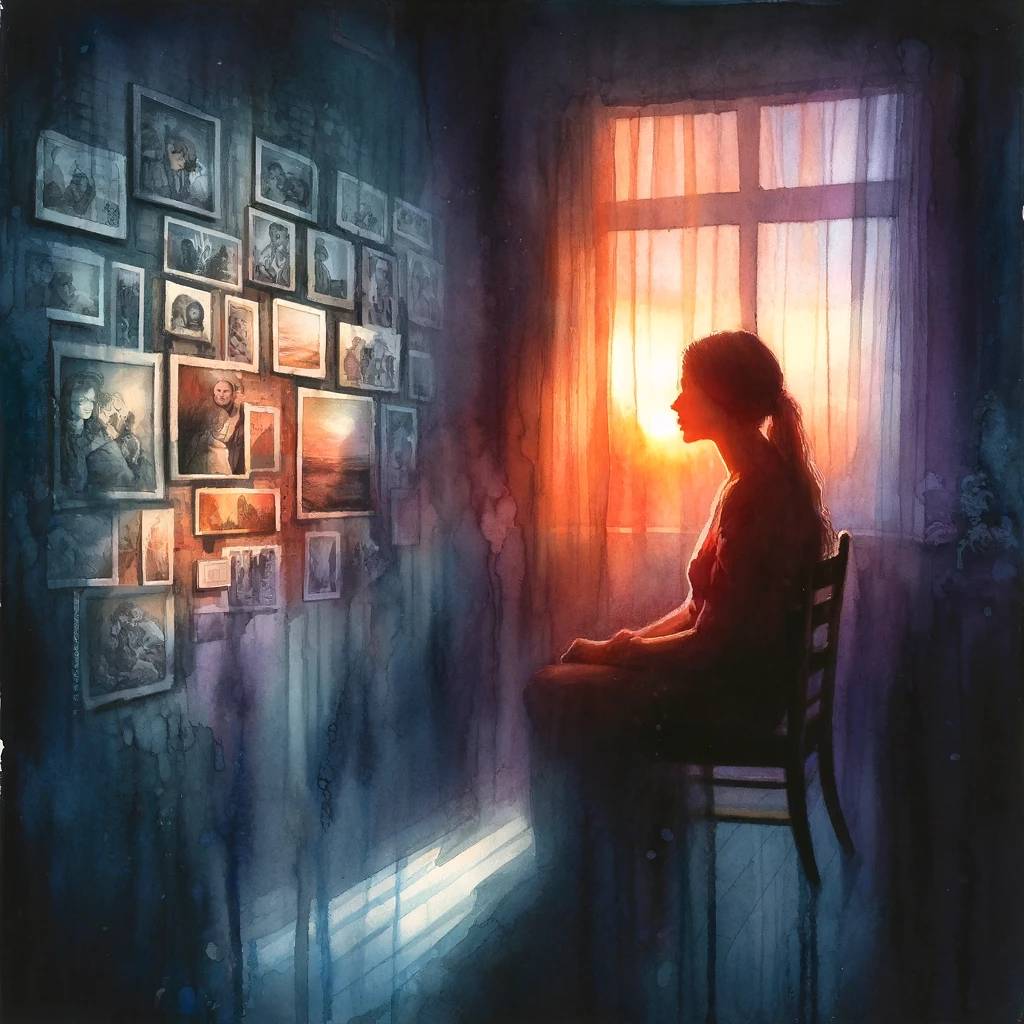
Meaning
“Echoes of Joy, Shadows of Pain” delves into the complex emotional landscape of a mother who has lost a child, exploring the coexistence of joyous memories and the profound grief of her loss. The poem paints a picture of a home filled with both the echoes of past happiness and the shadows of present sorrow, illustrating how these memories are preserved and altered by her grief. It speaks to the enduring nature of love, which survives even in the face of unimaginable pain.
Inspiration Behind
I envisioned a mother moving through her home, each step a reminder of past joys and present pains. The interplay of light and shadow in her daily life serves as a metaphor for her emotional state—bright memories of joy shadowed by the depth of her loss. This poem is a tribute to the strength of mothers who carry both joy and pain, their love enduring beyond the confines of their grief.
Tears on the Windowpane
Rain traces tears on glass,
Each drop a memory's echo.
Outside, the world in gray repose,
Inside, a mother's heart, alas.
Her gaze through wet panes lost,
Reflections blend with falling rain.
Each droplet whispers a silent name,
In grief, love's cost.
Yet through the storm, fierce, bold,
Her love does not wane nor weep alone.
Like rain, it nurtures, grows,
Filling her heart, brave and cold.

Meaning
“Tears on the Windowpane” is a poignant reflection on the internal experience of a bereaved mother. The poem draws a parallel between raindrops tracing down a window and the silent tears of a grieving mother. Each droplet represents a memory, echoing the presence of a lost child, while the juxtaposition of the external calm and the internal turmoil highlights the depth of her silent, enduring pain. The poem ultimately speaks to the resilience of maternal love, suggesting that, like rain nourishes the earth, her enduring love and grief foster a quiet, inner strength.
Inspiration Behind
The inspiration for this poem came from the image of a mother looking out through a rain-soaked window, lost in thought. I imagined her watching the raindrops, each one a reminder of moments spent with her child, now passed. This scene symbolizes the ongoing connection she feels, where the rain acts both as a manifestation of her grief and a metaphor for how she draws strength from her sorrow. It’s a depiction of the quiet, often unseen, endurance that characterizes a mother’s love through the trials of loss.
Whispers to the Stars
In the velvet cloak of night,
Mothers reach to distant light.
Their voices soft, their hearts alight,
As they send their love in flight.
Amongst the twinkling, distant spheres,
Their children's laughter softly hears.
Conversations dance on cosmic ears,
Echoes of love that perseveres.
With tears as stars, they paint the sky,
Their whispers carried, soaring high.
For though apart, their spirits nigh,
In the heavens, love will never die.

Meaning
“Whispers to the Stars” captures the tender moments of bereaved mothers speaking to their children who are no longer with them physically but are believed to be among the stars. The poem imagines these interactions as a celestial dialogue, where the enduring love and memories are sent upwards, transcending the bounds of Earth to reach the heavens.
Inspiration Behind
This poem was inspired by the poignant image of a quiet night where the sky becomes a canvas for the grief and love of mothers. I pictured these strong women looking up to the starlit sky, finding solace in the thought that their children, like stars, continue to shine brightly in the vast universe, listening to their heartfelt conversations.
Petals and Thorns
Petals fall in gentle rest,
Soft as whispers of the past.
Each a memory meant to last,
Fragrant, sweet, upon her breast.
Thorns hide 'neath the blooms so fair,
Piercing as she reaches in.
Love’s beauty marked by pain’s sharp pin,
Each grasp a reminder bare.
In her garden, grief does grow,
Petals and thorns in tangled throw.
Beauty marred, yet love does show,
Through every season, high and low.
She tends the buds with careful hands,
Nurtures love where sorrow lands.
For every thorn her heart withstands,
A petal falls, and understands.
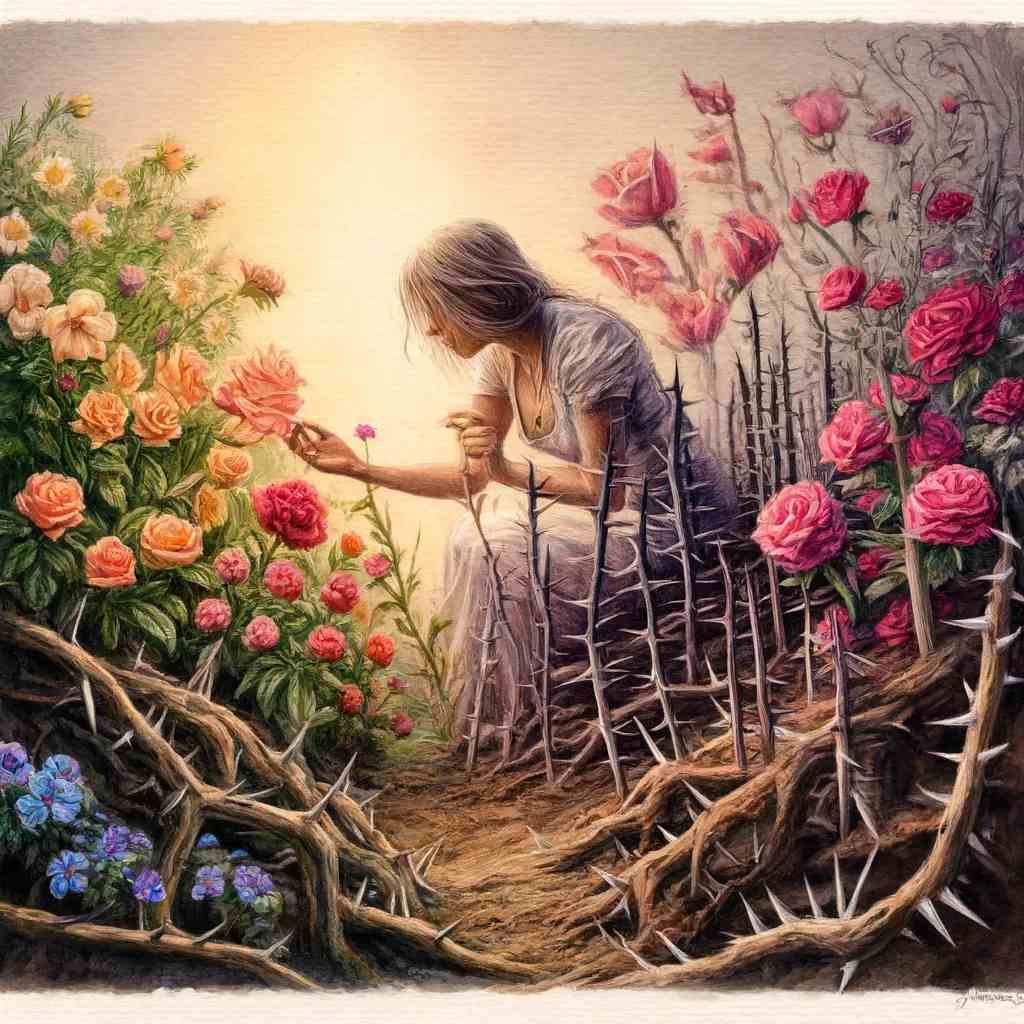
Meaning
“Petals and Thorns” reflects the complex interplay between the beauty of cherished memories and the sharp pain of loss a mother experiences after the passing of her child. The poem uses the metaphor of a garden where both delicate petals and piercing thorns exist, symbolizing the dual nature of love and grief. Each line explores how closely intertwined joy and sorrow can be, and how each element—petal and thorn—contributes to the fuller picture of her enduring love.
Inspiration Behind
Inspired by the image of a mother tending to a garden, where beauty and pain coexist, this poem emerged. I envisioned her touching both the soft petals and the sharp thorns, a poignant reminder of the bittersweet reality of holding onto memories of a loved one. It’s a tribute to the strength and resilience of mothers who nurture their love amidst the pain, finding a deep understanding in the natural cycle of growth and decay.
End Words
Bereaved Mother’s Day Poems delicately explore the complex emotions of bereaved mothers, balancing the weight of loss with the enduring strength of maternal love. Each piece offers a quiet reflection on the pain and beauty of memory, using natural imagery to illustrate the deep, personal experiences of grief and resilience. Through gentle metaphors and thoughtful expressions, the poems invite readers to understand and empathize with the silent journey of mourning and the subtle yet powerful presence of love that remains unyielding amidst sorrow.

